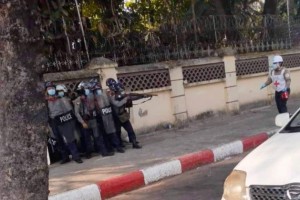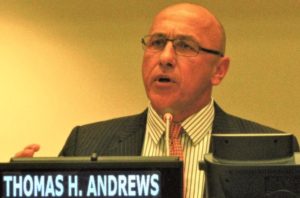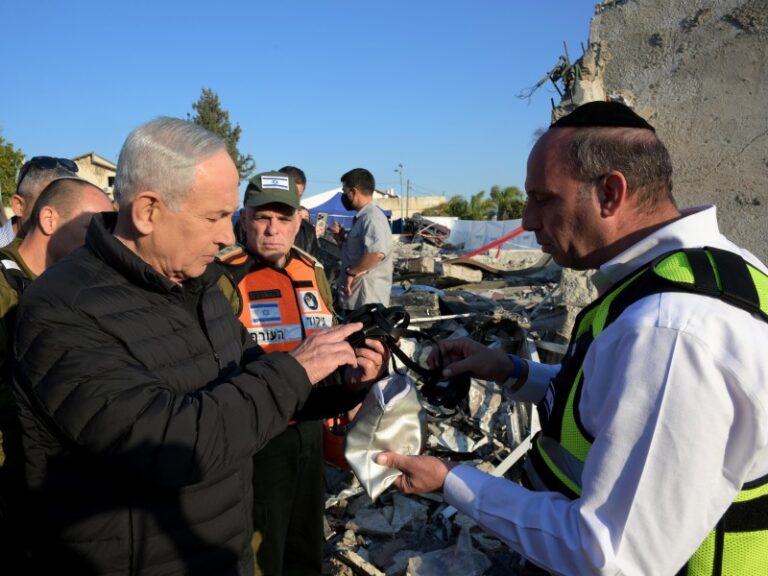
Photo credit: Ro Nay San Lwin @nslwin|Twitter

We present excerpts from a 52-page report submitted to the Human Rights Council on March 4, 2021 by the UN Special Rapporteur on the situation of human rights in Myanmar, Thomas H. Andrews. In the report Andrews details how the Myanmar military illegally overthrew the civilian government and proceeded to attack the people of Myanmar by committing the crimes of murder, assault and arbitrary detention.
Disproportionate use of force
The Special Rapporteur viewed dozens of videos and images showing Myanmar security forces using excessive force, including brutally beating unarmed individuals, unlawfully using less-lethal weapons such as slingshots, rubber bullets, and water cannons, and shooting people with live ammunition while breaking up protests and detaining individuals. Violent acts against protesters and civil-servant strikers occurred in at least Myitkyina and Waingmaw, Kachin State; Naypyitaw; numerous locations throughout Mandalay Region; Mawlamyine, Mon State; Myawaddy, Karen State; Myaungmya, Ayeyarwady Region; and Yangon.
For example, from the near outset of the coup, Mandalay police sanctioned the use of excessive force. According to an authenticated Mandalay police memorandum dated 3 February, police officers were instructed to “fire” at protesters “with a 12-gauge anti-riot shotgun if the protester is just one person” and “with a 38-mm anti-riot gun if the protesters are in a crowd.” The memo fails to note anything with regard to protecting the right to peaceful assembly. Aside from the shooting deaths and injuries on 28 February and at Yadanarbon Shipyard, Mandalay police have engaged in numerous other attacks against individuals, including the brutal beating of a 21-year-old man with cerebral palsy. The incident, captured on video viewed by the Special Rapporteur, shows a gauntlet of Myanmar police officers brutally beating the unarmed man with clubs.
Also read:
Military-backed counter-protest provocateurs have also engaged in attacks against protesters, most notably in Yangon beginning 25 February. The Special Rapporteur received credible reports that security forces and military-affiliated entities provided support to the violent counter-protesters. Specifically, police appeared to clear barricades from a protest site in Yangon, facilitating violent encounters with pro-democracy protestors. Some violent counter-protesters reportedly arrived in areas of Yangon in buses belonging to the military-owned conglomerate, Myanmar Economic Holding Limited. The Special Rapporteur received multiple reports, including in video and photographs, that provocateurs assaulted and stabbed pro-democracy protesters in broad daylight in Yangon on 25 February, with no police response.
The Special Rapporteur received video from 27 February showing security forces and plain-clothed individuals brutally beating unarmed protesters in Monywa, Sagaing Region. The mass killings perpetrated on 28 February including at least 30 injuries caused by excessive force, including non-lethal gunshot wounds. Arbitrary Detention
At the time of writing and, the junta has arbitrarily detained over 1,200 people since the beginning of the coup. Political prisoners include members of the NLD, Members of Parliament, UEC officials, political activists, civil society members, civil servants, journalists, lawyers, teachers, medics, students, and celebrities. The junta issued arrest warrants for at least 32 others who reportedly went into hiding. At the time of writing, the authorities convicted at least four of the 900 detainees and sentenced them to prison terms ranging from seven days to two years.
The police, military, plain-clothed authorities, and General Administration Department officers such as township and ward administrators have all carried out arbitrary detentions since the coup.
Security forces arbitrarily detained people during protests and from their homes during unlawful night-time raids without warning or warrant and sometimes blindfolded. Once detained, security forces confiscated phones, effectively cutting communications with family members, lawyers, or others. In the overwhelming majority of arrests, there is no indication of charges against detainees. The majority of the families of detainees received no information from the junta’s forces as to the wellbeing or whereabouts of their family members. Many of these detentions may thus amount to enforced disappearances.
Specific Groups
The NLD: State Counsellor Aung San Suu Kyi, President Win Myint, and nearly the entire NLD Central Executive Committee are believed to be detained. Reportedly, both the State Counsellor and President appeared before a court via video link on 16 February and 1 March. Aung San Suu Kyi has been charged under the Natural Disaster Management Law for allegedly violating Covid-19 restrictions while campaigning, under the Import-Export Law for possession of walkie-talkies, possession of an unlicensed telecommunication device under Section 67 of the Communications Law, and under Section 505 (b) of the Penal Code for inciting unrest. Win Myint has been charged under the Natural Disaster Management Law and under Section 505 (b). The next hearing for both is reportedly set for 15 March. Numerous other NLD figures have been charged, some appearing at secret hearings before a judge without access to legal representation. Myanmar police have also carried out night raids on the NLD’s offices and headquarters, including on 9 February, confiscating its computer system. The junta is working to systematically dismantle the NLD leadership and party.
Civil servants and protest organizers: Myanmar security forces carried out scores of arbitrary arrests of grassroots organizers of the CDM. Security forces detained civil servants including doctors, lawyers, police officers, teachers, officials with the Ministry of Foreign Affairs and Ministry of Planning, Finance and Industry, and others.
Union Election Commission: Security forces detained senior UEC officials as well as mid- and low-level officials across many States and Regions.
These mass arbitrary detentions violate Articles 9, 10, and 11 of the Universal Declaration of Human Rights, which, respectively, prohibit arbitrary arrest and detention; entitle everyone to a “fair and public hearing by an independent and impartial tribunal, in the determination of his rights and obligations and of any criminal charge against him”; and require everyone charged with a penal offence “the right to be presumed innocent until proved guilty according to law in a public trial at which he has had all the guarantees necessary for his defense.”
At the time of writing, families of those detained on 1 February are nearing four weeks without any information of the wellbeing and whereabouts of detained family members. According to the Working Group on Enforced and Involuntary Disappearances, an enforced disappearance occurs when an individual is detained by or with the acquiescence of state actors and there is no official acknowledgement or information about the individuals’ wellbeing and whereabouts. The extended period without communication or information on the whereabouts of detainees in Myanmar is creating a grave prospect of possible mass enforced disappearances.
Legal Restrictions on Civil and Political Rights
Since the military unlawfully seized power, the SAC has issued draconian decrees by amending existing law, establishing new regulations, and imposing its will on telecommunications companies, all illegitimately and in violation of the people of Myanmar’s right to freedom of expression, freedom of peaceful assembly and association, and access to information.
– Concluded
– global bihari bureau





